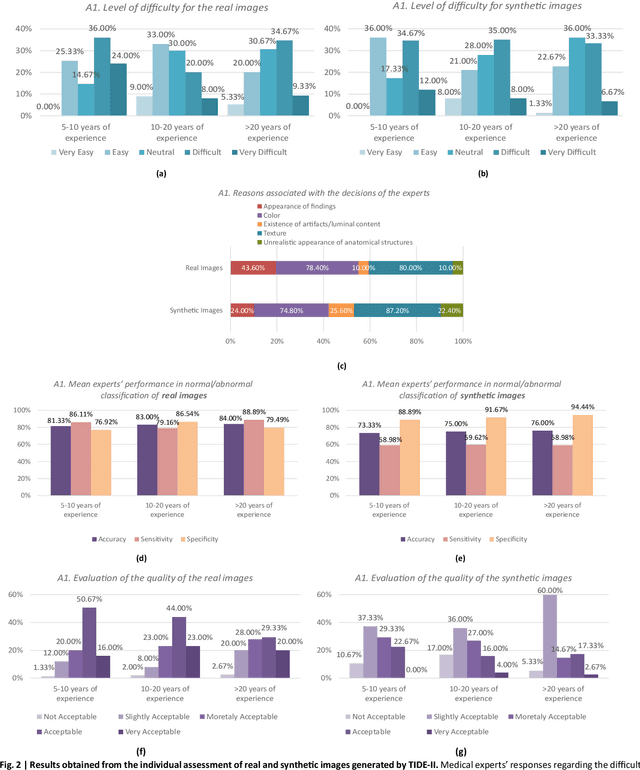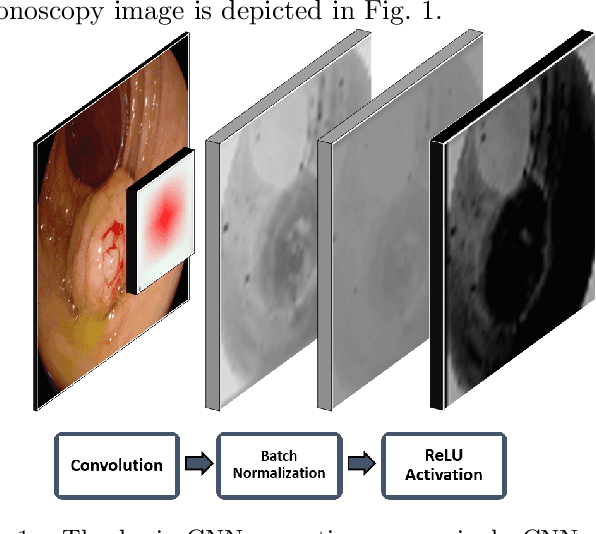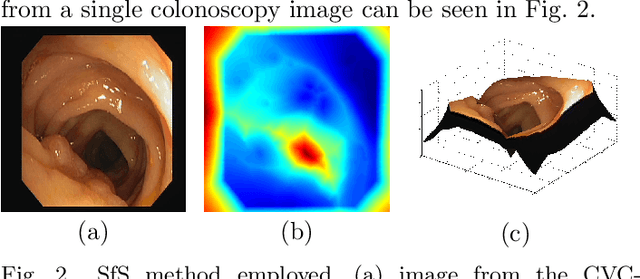Anastasios Koulaouzidis
Clinical Evaluation of Medical Image Synthesis: A Case Study in Wireless Capsule Endoscopy
Oct 31, 2024



Abstract:Sharing retrospectively acquired data is essential for both clinical research and training. Synthetic Data Generation (SDG), using Artificial Intelligence (AI) models, can overcome privacy barriers in sharing clinical data, enabling advancements in medical diagnostics. This study focuses on the clinical evaluation of medical SDG, with a proof-of-concept investigation on diagnosing Inflammatory Bowel Disease (IBD) using Wireless Capsule Endoscopy (WCE) images. The paper contributes by a) presenting a protocol for the systematic evaluation of synthetic images by medical experts and b) applying it to assess TIDE-II, a novel variational autoencoder-based model for high-resolution WCE image synthesis, with a comprehensive qualitative evaluation conducted by 10 international WCE specialists, focusing on image quality, diversity, realism, and clinical decision-making. The results show that TIDE-II generates clinically relevant WCE images, helping to address data scarcity and enhance diagnostic tools. The proposed protocol serves as a reference for future research on medical image-generation techniques.
This Intestine Does Not Exist: Multiscale Residual Variational Autoencoder for Realistic Wireless Capsule Endoscopy Image Generation
Feb 07, 2023



Abstract:Medical image synthesis has emerged as a promising solution to address the limited availability of annotated medical data needed for training machine learning algorithms in the context of image-based Clinical Decision Support (CDS) systems. To this end, Generative Adversarial Networks (GANs) have been mainly applied to support the algorithm training process by generating synthetic images for data augmentation. However, in the field of Wireless Capsule Endoscopy (WCE), the limited content diversity and size of existing publicly available annotated datasets, adversely affect both the training stability and synthesis performance of GANs. Aiming to a viable solution for WCE image synthesis, a novel Variational Autoencoder architecture is proposed, namely "This Intestine Does not Exist" (TIDE). The proposed architecture comprises multiscale feature extraction convolutional blocks and residual connections, which enable the generation of high-quality and diverse datasets even with a limited number of training images. Contrary to the current approaches, which are oriented towards the augmentation of the available datasets, this study demonstrates that using TIDE, real WCE datasets can be fully substituted by artificially generated ones, without compromising classification performance. Furthermore, qualitative and user evaluation studies by experienced WCE specialists, validate from a medical viewpoint that both the normal and abnormal WCE images synthesized by TIDE are sufficiently realistic.
Towards a Computed-Aided Diagnosis System in Colonoscopy: Automatic Polyp Segmentation Using Convolution Neural Networks
Jan 15, 2021



Abstract:Early diagnosis is essential for the successful treatment of bowel cancers including colorectal cancer (CRC) and capsule endoscopic imaging with robotic actuation can be a valuable diagnostic tool when combined with automated image analysis. We present a deep learning rooted detection and segmentation framework for recognizing lesions in colonoscopy and capsule endoscopy images. We restructure established convolution architectures, such as VGG and ResNets, by converting them into fully-connected convolution networks (FCNs), fine-tune them and study their capabilities for polyp segmentation and detection. We additionally use Shape from-Shading (SfS) to recover depth and provide a richer representation of the tissue's structure in colonoscopy images. Depth is incorporated into our network models as an additional input channel to the RGB information and we demonstrate that the resulting network yields improved performance. Our networks are tested on publicly available datasets and the most accurate segmentation model achieved a mean segmentation IU of 47.78% and 56.95% on the ETIS-Larib and CVC-Colon datasets, respectively. For polyp detection, the top performing models we propose surpass the current state of the art with detection recalls superior to 90% for all datasets tested. To our knowledge, we present the first work to use FCNs for polyp segmentation in addition to proposing a novel combination of SfS and RGB that boosts performance
* 10 pages, 6 figures
 Add to Chrome
Add to Chrome Add to Firefox
Add to Firefox Add to Edge
Add to Edge